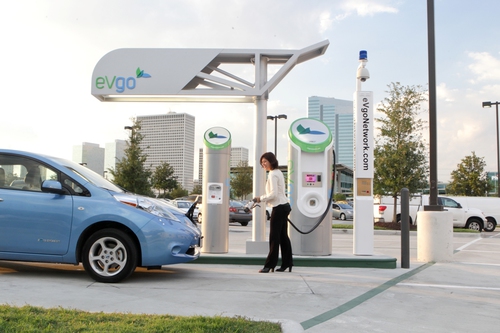Who pays for the highway system? In the U.S. the roads are paid for, primarily, by gasoline taxes, but that’s by no means the pattern around the world for highway transportation funds![]() . Electric vehicles do not consume gasoline, so therefore electric vehicle owners aren’t paying into the funding of the highway system. You can argue, therefore, that electric vehicle owners are either lucky or abusing the system. I have seen news articles concerning homebrew biodiesel advocates who were arrested for nonpayment of highway taxes, because their homebrew biodiesel also fell outside the normal road tax collection system.
. Electric vehicles do not consume gasoline, so therefore electric vehicle owners aren’t paying into the funding of the highway system. You can argue, therefore, that electric vehicle owners are either lucky or abusing the system. I have seen news articles concerning homebrew biodiesel advocates who were arrested for nonpayment of highway taxes, because their homebrew biodiesel also fell outside the normal road tax collection system.
Collecting a tax at the fuel pump is an excellent method of collecting money to pay for the highways. The tax is anonymous, meaning the government can’t use the tax as a sneaky way to track our movements. The tax is fair, because those who use more fuel are probably driving more miles and doing more damage to the roads. But owners of efficient vehicles pay proportionately smaller taxes, because they use less gasoline per mile. Owners of electric vehicles pay zero taxes, because they don’t use gasoline to go travel down the road. Is either of these situations fair?
Calling this a “gasoline tax” strikes me as a poor way to describe what’s going on. The purpose of taxing gasoline was to collect road usage fees. Why not call it a “Road Use Tax” instead of “Gasoline Tax”? By pigeon-holing this as a “gasoline tax” we collectively run into a problem in understanding how to apply a “Gasoline Tax” to electric car owners who don’t use that stinky stuff. But if it were couched as a “Road Use Tax” then one could imagine several methods of collecting such a tax.
An example of the cognitive problem is this article, “Own an electric car? You may be paying ‘non gas consumption’ taxes soon![]() “. The title describes the electric car taxes described in this post in terms of a payment for non-consumption of gasoline. This is backwards. The fee needs to be based on vehicle miles driven whether it’s a gasoline or diesel or electric vehicle.
“. The title describes the electric car taxes described in this post in terms of a payment for non-consumption of gasoline. This is backwards. The fee needs to be based on vehicle miles driven whether it’s a gasoline or diesel or electric vehicle.
I like several attributes of the Gasoline Tax system, as I said above. Anonymity is a big one because, if the government is going to start collecting a fee for using the highway, how will this be prevented from becoming a Big Brother thing where the Government knows our every move?
For example, some states have toll roads everywhere, and every 10 miles or so the drivers pass through toll booths. Or there will be toll booths at every entry and exit to the highway. The modern way to do this is to install an RFID dongle in the car, and place sensors along the road tallying which cars drove where, and then calculating a road usage fee. Some areas are already doing this to pay for bridge tolls. While this is a method of collecting real road usage data for each car, it also informs the government of the movements of every car. Big Brother anyone?
Washington State has passed a law for an electric car tax![]() that will go into effect in February that imposes a $100 flat fee per electric car per year. This is good in that it doesn’t put the government into the role of tracking our every move to calculate a 100% correct road usage fee. It means the road fees won’t be paid in correlation with road usage, but that it’s just a flat fee on everyone.
that will go into effect in February that imposes a $100 flat fee per electric car per year. This is good in that it doesn’t put the government into the role of tracking our every move to calculate a 100% correct road usage fee. It means the road fees won’t be paid in correlation with road usage, but that it’s just a flat fee on everyone.
Oregon is proposing a law for a per-mile tax![]() , but I wasn’t able to find any information on how they would determine the vehicle miles driven.
, but I wasn’t able to find any information on how they would determine the vehicle miles driven.
- Highway design could decrease death and injury risk, if “we” chose smarter designs - March 28, 2015
- GM really did trademark “range anxiety”, only later to abandon that mark - March 25, 2015
- US Government releases new regulations on hydraulic fracturing, that some call “toothless” - March 20, 2015
- Tesla Motors magic pill to solve range anxiety doesn’t quite instill range confidence - March 19, 2015
- Update on Galena IL oil train – 21 cars involved, which were the supposedly safer CP1232 design - March 7, 2015
- Another oil bomb train – why are they shipping crude oil by train? – Symptoms of fossil fuel addiction - March 6, 2015
- Chevron relinquishes fracking in Romania, as part of broader pull-out from Eastern European fracking operations - February 22, 2015
- Answer anti- electric car articles with truth and pride – truth outshines all distortions - February 19, 2015
- Apple taking big risk on developing a car? Please, Apple, don’t go there! - February 16, 2015
- Toyota, Nissan, Honda working on Japanese fuel cell infrastructure for Japanese government - February 12, 2015











